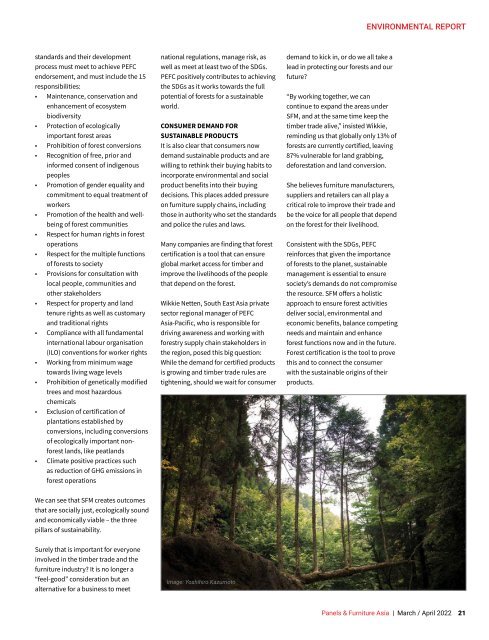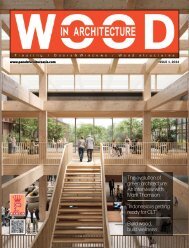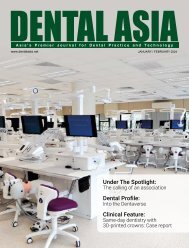Panels & Furniture March/April 2022
Panels & Furniture Asia (PFA) is a leading regional trade magazine dedicated to the woodbased panel, furniture and flooring processing industry. Published bi-monthly since 2000, PFA delivers authentic journalism to cover the latest news, technology, machinery, projects, products and trade events throughout the sector. With a hardcopy and digital readership comprising manufacturers, designers and specifiers, among others, PFA is the platform of choice for connecting brands across the global woodworking landscape.
Panels & Furniture Asia (PFA) is a leading regional trade magazine dedicated to the woodbased panel, furniture and flooring processing industry. Published bi-monthly since 2000, PFA delivers authentic journalism to cover the latest news, technology, machinery, projects, products and trade events throughout the sector. With a hardcopy and digital readership comprising manufacturers, designers and specifiers, among others, PFA is the platform of choice for connecting brands across the global woodworking landscape.
You also want an ePaper? Increase the reach of your titles
YUMPU automatically turns print PDFs into web optimized ePapers that Google loves.
ENVIRONMENTAL REPORT<br />
standards and their development<br />
process must meet to achieve PEFC<br />
endorsement, and must include the 15<br />
responsibilities:<br />
• Maintenance, conservation and<br />
enhancement of ecosystem<br />
biodiversity<br />
• Protection of ecologically<br />
important forest areas<br />
• Prohibition of forest conversions<br />
• Recognition of free, prior and<br />
informed consent of indigenous<br />
peoples<br />
• Promotion of gender equality and<br />
commitment to equal treatment of<br />
workers<br />
• Promotion of the health and wellbeing<br />
of forest communities<br />
• Respect for human rights in forest<br />
operations<br />
• Respect for the multiple functions<br />
of forests to society<br />
• Provisions for consultation with<br />
local people, communities and<br />
other stakeholders<br />
• Respect for property and land<br />
tenure rights as well as customary<br />
and traditional rights<br />
• Compliance with all fundamental<br />
international labour organisation<br />
(ILO) conventions for worker rights<br />
• Working from minimum wage<br />
towards living wage levels<br />
• Prohibition of genetically modified<br />
trees and most hazardous<br />
chemicals<br />
• Exclusion of certification of<br />
plantations established by<br />
conversions, including conversions<br />
of ecologically important nonforest<br />
lands, like peatlands<br />
• Climate positive practices such<br />
as reduction of GHG emissions in<br />
forest operations<br />
national regulations, manage risk, as<br />
well as meet at least two of the SDGs.<br />
PEFC positively contributes to achieving<br />
the SDGs as it works towards the full<br />
potential of forests for a sustainable<br />
world.<br />
CONSUMER DEMAND FOR<br />
SUSTAINABLE PRODUCTS<br />
It is also clear that consumers now<br />
demand sustainable products and are<br />
willing to rethink their buying habits to<br />
incorporate environmental and social<br />
product benefits into their buying<br />
decisions. This places added pressure<br />
on furniture supply chains, including<br />
those in authority who set the standards<br />
and police the rules and laws.<br />
Many companies are finding that forest<br />
certification is a tool that can ensure<br />
global market access for timber and<br />
improve the livelihoods of the people<br />
that depend on the forest.<br />
Wikkie Netten, South East Asia private<br />
sector regional manager of PEFC<br />
Asia-Pacific, who is responsible for<br />
driving awareness and working with<br />
forestry supply chain stakeholders in<br />
the region, posed this big question:<br />
While the demand for certified products<br />
is growing and timber trade rules are<br />
tightening, should we wait for consumer<br />
demand to kick in, or do we all take a<br />
lead in protecting our forests and our<br />
future?<br />
“By working together, we can<br />
continue to expand the areas under<br />
SFM, and at the same time keep the<br />
timber trade alive,” insisted Wikkie,<br />
reminding us that globally only 13% of<br />
forests are currently certified, leaving<br />
87% vulnerable for land grabbing,<br />
deforestation and land conversion.<br />
She believes furniture manufacturers,<br />
suppliers and retailers can all play a<br />
critical role to improve their trade and<br />
be the voice for all people that depend<br />
on the forest for their livelihood.<br />
Consistent with the SDGs, PEFC<br />
reinforces that given the importance<br />
of forests to the planet, sustainable<br />
management is essential to ensure<br />
society’s demands do not compromise<br />
the resource. SFM offers a holistic<br />
approach to ensure forest activities<br />
deliver social, environmental and<br />
economic benefits, balance competing<br />
needs and maintain and enhance<br />
forest functions now and in the future.<br />
Forest certification is the tool to prove<br />
this and to connect the consumer<br />
with the sustainable origins of their<br />
products.<br />
We can see that SFM creates outcomes<br />
that are socially just, ecologically sound<br />
and economically viable – the three<br />
pillars of sustainability.<br />
Surely that is important for everyone<br />
involved in the timber trade and the<br />
furniture industry? It is no longer a<br />
“feel-good” consideration but an<br />
alternative for a business to meet<br />
Image: Yoshihiro Kazumoto<br />
<strong>Panels</strong> & <strong>Furniture</strong> Asia | <strong>March</strong> / <strong>April</strong> <strong>2022</strong> 21


















